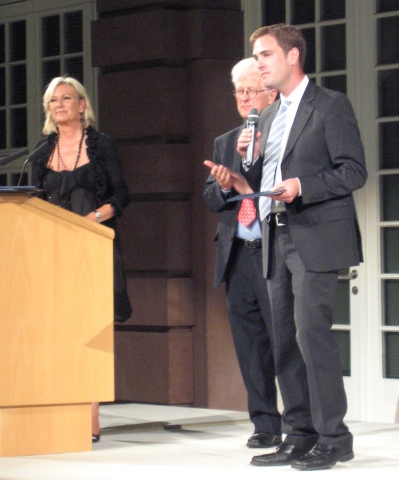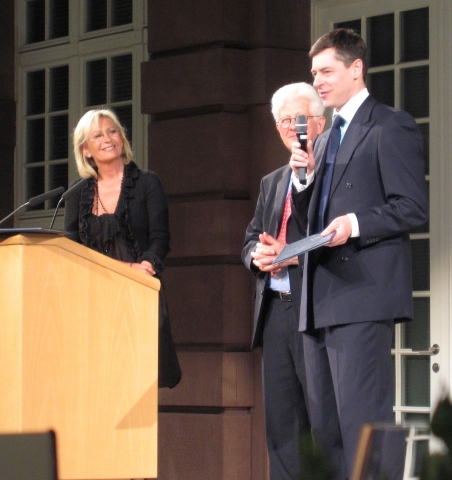
From left to right: Burns Alumnus James Hagengruber, Former Polish President Aleksander Kwaśniewski, Burns Trustee Sabine Christiansen, Karsten Voigt, Burns Alumnus Jacob Heilbrunn.

James Hagengruber (right) received the honor for his article on two twins' quest to join the U.S. marines.

Jacob Heilbrunn (right) was awarded for his commentary on the U.S. election campaign.
Michael Weissenborn (right) was awarded the German Burns Award. During his acceptance, he stands beside his proud wife Ulrike.
Three Burns alumni won the 2007 Burns and Kennan Commentary Awards on May 15. The award-winning stories tackle: life on the Texas-Mexico border; twins’ quest to become marines in Iraq; and analysis of the U.S. Presidential elections.
Michael Weissenborn (right) was awarded the German Burns Award. During his acceptance, he stands beside his proud wife Ulrike.
James Hagengruber (Burns 2002), who was laid off by the Spokesman (Spokane, Wash.) Review at the end of last year, won the U.S. Burns Award for “Boom! Du bist tot! (Boom! You are dead!),” published in German by
Michael Weissenborn (right) was awarded the German Burns Award. During his acceptance, he stands beside his proud wife Ulrike.
The two 2,000-Euro prizes were awarded by Germany’s Foreign Minister. Hagengruber received his honor at the annual Burns Alumni dinner and lecture on May 15 in Berlin, while Weissenborn will be honored by German Ambassador Klaus Scharioth at his Washington residence on July 23.
Michael Weissenborn (right) was awarded the German Burns Award. During his acceptance, he stands beside his proud wife Ulrike.
Rüttger’s article addressed the dangers and temptations for truck drivers along the 414-mile-long Dalton Highway through the Alaskan tundra. Schevitz’s nine-part series tackled episodes and impressions gained as a single mother, big-city girl and passionate driver in the rural, pre-alpine lands of southwestern Bavaria. Both authors stimulated intensive debates through letters to the editor and emails to the reporters. The communication with the Burns fellows was especially interesting, as both were foreign to their host country and could speak openly about regional traditions and taboos.
The 2,000-Euro George F. Kennan Commentary Award went to U.S. journalist and Burns alumnus Jacob Heilbrunn (1994).
Michael Weissenborn (right) was awarded the German Burns Award. During his acceptance, he stands beside his proud wife Ulrike.
The jury noted that Heilbrunn managed to write a “very sophisticated analysis of the U.S. election campaign, which highlights the specifics of this year's race for the White House and includes some surprising insights. The author explains how a hapless U.S. President rejuvenated American liberals and their cause—which had become more and more discredited until President Bush rekindled their enthusiasm. Heilbrunn compares Bush to Al Gore, who–almost simultaneously to Bush’s fall in public opinion polls–gained public prestige.”
The jury also pointed out the fine work of illustrator Christoph Niemann, whose prominent drawings of annual vignettes of the Bush era contributed significantly to the appeal of the presentation for this commentary story.
The jury for both awards was composed of journalists Sabine Christiansen (ARD), Dr. Christoph von Marschall (Tagesspiegel), Claus Strunz (Bild am Sonntag), Florian Illies (Die Zeit/Monopol) and Dominik Wichmann (Süddeutsche Zeitung), as well as Dr. Frank-Dieter Freiling (ZDF) and Martina Nibbeling-Wriessnig (Foreign Ministry of Germany).
2006 Burns Award Winners
2005 Burns Award Winners
2004 Burns Award Winners
2003 Burns Award Winners
2002 Burns Award Winners